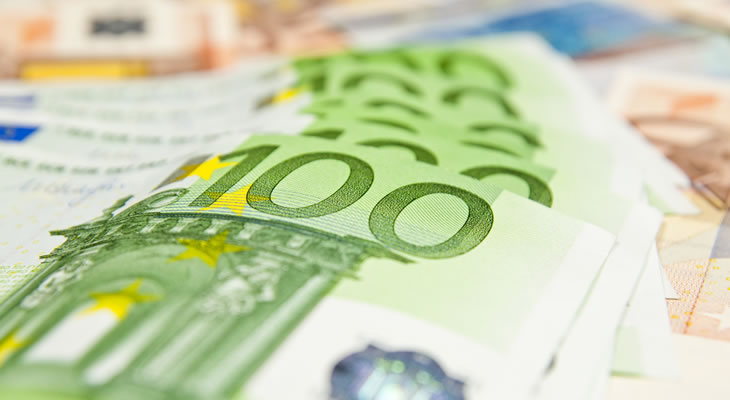- Weak US manufacturing survey boosted Euro – Chances of imminent Fed rate hike declined
- ‘Brexit’ uncertainty continued to influence Pound – ICM phone poll indicated greater ‘Remain’ lead
- UK inflation muted – GBP failed to weaken in response to disappointing CPI results
- Greek bailout forecast to weigh on single currency – GBP/EUR exchange rate to benefit from concern over approaching bailout review deadline
Fed Hike Speculation Boosts GBP/EUR Exchange Rate
Ahead of the day’s raft of UK employment data the Pound Sterling to Euro (GBP/EUR) exchange rate trended higher on Wednesday morning. Demand for the Euro (EUR) has been dented by renewed speculation that the Federal Reserve could hike rates in June, prompted by strong US inflation figures. As a result the GBP/EUR currency pair was making gains around 1.2815.
Earlier…
‘Brexit’ and Greek Bailout Concerns Weighed on Pound (GBP) & Euro (EUR)
As the EU referendum draws nearer, Pound Sterling (GBP) remains particularly vulnerable to developments within the ongoing ‘Brexit’ debate. While investors had reacted positively to cautions from the Bank of England (BoE) and International Monetary Fund (IMF) ahead of the weekend this bullishness wore off at the start of the week.
This was largely due to the Confederation of British Industry (CBI), which lowered its growth forecasts for the UK economy. The CBI also indicated that referendum uncertainty had already prompted businesses to delay investment and further spending, reacting to fears that the UK could vote to leave the EU. As a result the Pound weakened, in spite of the Rightmove House Prices survey showing continued strength within the domestic housing market.
A weak US Empire Manufacturing Index prompted the Euro (EUR) to strengthen, meanwhile, as the likelihood of a June rate hike from the Fed seemed more limited. While Federal Open Market Committee (FOMC) policymaker Jeffrey Lacker suggested that the case for an imminent interest rate rise looked ‘pretty strong’, this was not enough to keep confidence in the US economy buoyed. Due to the negative correlation of the Euro to US Dollar (EUR/USD) exchange rate, this slowing in the US manufacturing sector allowed the single currency to trend higher against rivals.
However, the Euro was unable to attain particular bullishness due to reigniting worries over the future of the Greek bailout review. While the Greek parliament is set to vote on the final raft of creditor-mandated austerity measures over the weekend, there are concerns that Prime Minister Alexis Tsipras’ narrow majority might not be enough. Should the measures be defeated, the current timetable will be thrown significantly off course and the chances of a fresh debt crisis heightened.
Disappointing UK Inflation Report Failed to Provoke GBP/EUR Exchange Rate Slump
Worries over the outlook of the Hellenic nation continued to escalate on Tuesday morning after the IMF announced its desire for Greece to receive debt relief until 2040. As this request is unlikely to go down particularly well with other creditors, such as Germany, the future of the IMF’s involvement in the bailout came under renewed question. With tensions only likely to rise ahead of next week’s pivotal Eurogroup, meeting the single currency found little in the way of support.
Markets were surprised to find that the UK’s April Consumer Price Index report was weaker-than-expected, meanwhile. Domestic inflationary pressure slipped from 0.5% to 0.3% on the year, with the core CPI also demonstrating a decline. This discouraging result saw the Pound Sterling to Euro (GBP/EUR) exchange rate lose some of its bullishness, retreating from a three-week high of 1.2814. While the figures were disappointing at first glance researchers at ING noted;
‘Although April’s inflation data fell short of market expectations, it is worth noting that it is in line with the forecast provided by the Bank of England in its latest inflation report and thus should not come as much of a surprise to policymakers. Indeed, in light of the forthcoming EU referendum, the focus is now more on the activity data than prices.’
As the latest phone poll from ICM indicated that respondents were split 47%-39% in favour of the UK remaining in the EU, the appeal of the Pound was enhanced further. The odds of a ‘Brexit’ seemed to have dipped further in the wake of recent warnings against the potential negative impacts such a move could have on the domestic economy.

Stronger US inflation also helped to undermine the appeal of the Euro, meanwhile, with inflation in the world’s largest economy advancing at its fastest pace in three years. This bullish result prompted a resurgence in speculation over the likelihood of a June interest rate hike from the Fed, allowing the single currency to soften against rivals.
GBP/EUR Exchange Rate Forecast: Weaker UK Wage Growth May Turn Pound Bearish
Tomorrow’s raft of UK employment data is expected to cause more pronounced volatility for Sterling. Expectations suggest that Average Weekly Earnings weakened in the three months to March, a sign that is likely to encourage the BoE to hold tight on interest rates for some time to come. Softer employment conditions would not lend much support to the outlook of the UK economy, with the GBP/EUR exchange rate predicted to trend lower in response.
While the finalised Eurozone CPI for April is not anticipated to show any change in domestic inflationary pressure, the Euro may struggle to make particular gains on the back of a reminder of the currency union’s weak levels of inflation. Any response to the IMF’s latest suggestion on Greek debt relief could also drive demand for the common currency.
Current GBP, EUR Exchange Rates
At the time of writing, the Pound Sterling to Euro (GBP/EUR) exchange rate was trending higher around 1.2771, while the Euro to Pound Sterling (EUR/GBP) pairing was slumped in the region of 0.7829.


Comments are closed.